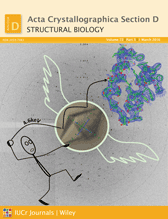issue contents
January 1995 issue

Cover illustration: Active site of purine nucleoside phosphorylase with the electrostatic potential surface and dipole of guanine. Rendered with Ribbons++ and SPARTAN.
international union of crystallography
Free 

research papers
Diffraction data collected from flash-cooled hemagglutinin crystals show improvements in both resolution and quality relative to data collected at 277 K. Radiation damage, while reduced, is not eliminated in the flash-cooled crystals when irradiated with synchrotron-generated X-rays.
A general method to deconvolute oscillation data sets from twinned protein crystals to a corresponding single crystal data set has been developed. Application of this method to crystals of a C-terminal fragment of nitrate reductase is described.
Energy-minimization studies reveal a large conformational change that closes the substrate-access cleft thereby providing enhanced protein-substrate interactions.
PDB reference: 2bmh
The crambin structure has been resolved ab initio using the `shake-and-bake' method which consists of a phase-refinement procedure based on the minimal function alternated with Fourier refinement.
The structure of OppA is determined using maximum-likelihood phasing with MAD data collected at four wavelengths about the uranium LIII edge.
PDB reference: 1olb
The crystal structure of the somatostatin analogue octreotide was determined. The octapeptide crystallizes with three independent molecules which exhibit two different backbone conformations.
CCDC reference: 1302496
The crystal structure of octreotide was used to compare six different data-collection systems including synchrotron, Cu Kα and Mo Kα radiation, four different position-sensitive detectors and, in two cases, cryogenic methods.
IADH prepared from Drosophila lebanonensis yields well ordered crystals which diffract to better than 2.3 Å resolution. The crystallographic parameters and the orientation of the ADH dimer within the crystal cell are determined.
The structure of Fusariiim oxysporum trypsin, refined at 1.55 Å, is presented and compared to other trypsins. Catalytic activity and substrate specificity are investigated by biochemical methods and related to the crystal structure,
PDB reference: 1try
The method of time-averaging crystallographic refinement is assessed using a small molecule, α-cyclodextrin, as a test system. For data up to 2.0 Å resolution the exact electron-density map is reproduced better than by using anisotropic temperature-factor refinement.
Water molecules, which neither accept hydrogen bonds from O-H or N-H donors nor coordinate to metal ions in compensation usually satisfy their acceptor potential with C-H⋯O hydrogen bonds. They are found in peptides, purines and pyrimidines, and in alkaloid hydrates.
Lysozyme strtictures at six different temperatures in the range 95-295 K have been determined at a resolution of 1.7 Å. The temperature dependence of the structure of lysozyme together with properties of protein-bound water are analyzed.
A weighted correlation function is proposed as a method for computing electron-density maps. The article shows the potential of the method to improve conventional Fourier maps.
short communications
The crystallization conditions for obtaining the triclinic and the orthorhombic crystal forms of human Clara cell 16 kDa protein (CC 10) are reported.
Recombinant horseradish peroxidase has been crystallized in space group P3112, with four molecules in the asymmetric unit.
An Fab fragment from a monoclonal antibody ME36.1, that recognizes the melanoma-associated GD2 ganglioside has been purified and crystallized. Diffraction data have been collected to 2.5 Å resolution. A soluble form of the carbohydrate has been purified and small co-crystals of the Fab-GD2 complex have been obtained.


 journal menu
journal menu

































